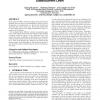499 search results - page 11 / 100 » Search Engines that Learn from Implicit Feedback |
PKDD
2010
Springer
14 years 9 months ago
2010
Springer
Abstract. In preference learning, the algorithm observes pairwise relative judgments (preference) between items as training data for learning an ordering of all items. This is an i...
WWW
2009
ACM
15 years 11 months ago
2009
ACM
As with any application of machine learning, web search ranking requires labeled data. The labels usually come in the form of relevance assessments made by editors. Click logs can...
87
Voted
SIGIR
2008
ACM
14 years 11 months ago
2008
ACM
We examine the effect of incorporating gaze-based attention feedback from the user on personalizing the search process. Employing eye tracking data, we keep track of document part...
103
click to vote
SIGIR
2003
ACM
15 years 4 months ago
2003
ACM
Current Web search engines generally impose link analysis-based re-ranking on web-page retrieval. However, the same techniques, when applied directly to small web search such as i...
117
click to vote
ICFCA
2005
Springer
15 years 4 months ago
2005
Springer
A key difficulty in the maintenance and evolution of complex software systems is to recognize and understand the implicit dependencies that define contracts that must be respecte...

